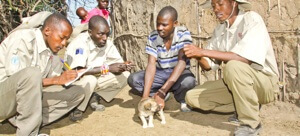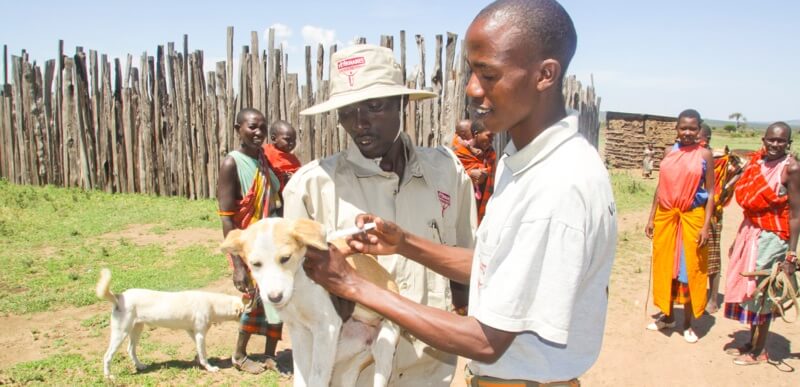 Rabies
Rabies
A risk for animal and human
Germany has been free of rabies for five years as announced by the Federal Ministry of Food and Agriculture in 2008. A well-functioning system of vaccination and a proper medical treatment have had the effect that the illness does not pose a concrete danger any more. Hence, it is easily forgotten that rabies is still a real threat for people in other parts of the world. The ethnic group of the Massai in our project area knows rabies very well and they also recognize it when it occurs. What they have lacked so far was the knowledge about the transfer to humans and the possibility of vaccination against rabies. So when we first approached the Massai in order to offer free vaccination for their dogs we looked into skeptical faces.
Necessity
There are still many fatalities of humans through rabies even though an infection can be avoided with a simple vaccination of dogs.
Activity
Veterinarians Without Borders is sending Kenyan vets to isolated villages in order to protect people without access to health care against rabies and raise awareness.
Countable effort
Amount of vaccinations of domestic and herding dogs.
Result
Measurable reduction of infections from dogs to humans through sensitive contact with animals and vaccination.
Systemic effect
Improved health and less dangerous contact of humans with dogs and wild animals.
Background
With their project against rabies in the Kenyan Masai Mara (Serengeti National Park) Veterinarians Without Borders e.V. (Vétérinaires sans Frontiers VSF) aims to contribute to protect both, humans and animals, against an infection through rabies. Keeping dogs is a common means in order to protect farm animals such as goats or chickens against attacks of predators. Alone in our project area there are about 20.000 domestic and herding dogs.
According to the World Health Organization (WHO) more than 55.000 people die of rabies each year, about 95 per cent in Africa and Asia. The most frequent source of infection for humans is the dog: 99 per cent of fatalities of humans through rabies worldwide are traced back to transmission of the virus via bites of infected domestic and herding dogs. Children are particularly endangered, as 40 per cent of the victims of rabies-infected dog bites are children below 15 years. Often they are bitten or scraped by dogs when playing with them. It is especially fatal that they are not aware of the threat of an infection through rabies and therefore do not even raise attention to small injuries. But only when treating a bite immediately and competent it is possible to stop the illness. A treatment basically consists of cleaning, disinfection and immunization and costs about 40 US$ in Africa. With an average income of 1,5 US$ per day and person it is almost impossible for an average household to afford these costs. In order to worldwide contain rabies cost-efficient the WHO advises to vaccinate dogs preventatively.
The good deed
The cycle of the project is simple and yet effective: Once or twice a year teams consisting of two to three of our local vets drive with their jeeps to the isolated villages. They are equipped with injections and medication against other frequent animal diseases. Via megaphone the village inhabitants are being informed ahead about the planned vaccinations so they do not migrate to far away meadows with their droves and dogs. The team then moves from village to village within our project area and vaccinates every dog and partly even the rare cats. As there are no veterinary basic services our teams are the only ones to offer veterinary support.
Challenge
Logistical challenges of our work consist in the approach and the transport of the vaccination boxes, which need continuous refrigeration. Moreover, it is still unusual for the Massai to vaccinate their dogs as dogs are considered to be farm animals and kept for a certain function. Therefore we need to clarify sense, purpose and advantages of our intervention before the vaccination.

AboutKenya
Nairobi
Capital
41.800.000
Number of inhabitants
1,016 USD
Gross domestic product per capita per year
145
Human Development Index
Famous for its breathtaking landscape, wildlife and safaris
About the organization and further information
Association
Tierärzte ohne Grenzen e.V.
DZI- Spendensiegel




